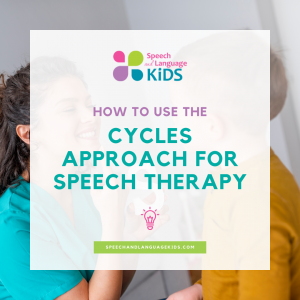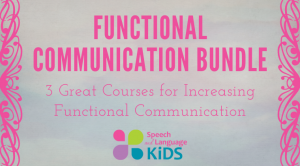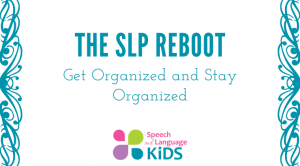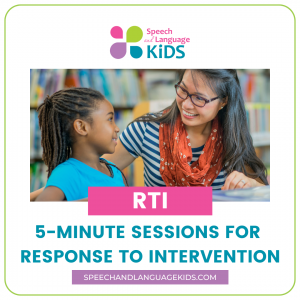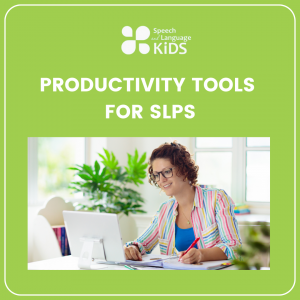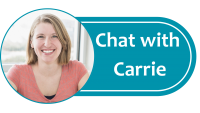Resources for Speech-Language Professionals (SLPs, SLPAs, SaLTs, etc.)
Welcome to our resource page for speech-language professionals! We are the speech-language pathologists, speech and language therapists, speech-language pathology aides, and other professionals who are working day after day to help children all over the world communicate effectively with those around them.
And sometimes, that job can feel darn near impossible. Our caseloads are high and our workloads are even higher. It’s easy to feel isolated from our colleagues and overwhelmed by information all at the same time.
But I’m here to help. I’m Carrie Clark, a speech-language pathologist from Missouri, and I want to help you love your job again!

❤️ Carrie’s Guide to Loving your Job ❤️
We all got into this profession because we wanted to help children. Not because we love paperwork. But somewhere along the way we get so bogged down in the OTHER stuff that has to get done that the stress overrides our love of helping children. Here are the ways to decrease your stress and love your job:
1. Increase Your Confidence
Let’s face it, our profession covers a TON of areas and no two children that you see will be alike. It’s easy to feel like you don’t know what you’re doing or that you don’t know the best way to help a child. That’s why step number one to loving your job is to boost your confidence.
Here on the Speech and Language Kids website, I’ve put together hundreds of resources that will boost your confidence by showing you exactly how to treat a variety of speech/language/communication skills. Plus, I’ve put together no-prep resources that you can print and use in therapy right away so you won’t have to guess at how to implement the strategies I’m teaching you.
2. Decrease your Workload
Ok, I know what you’re thinking: “Carrie, that would be great but how the heck do I do that??” Don’t worry, I have strategies! There are plenty of things you can do to streamline what you’re doing and organize everything in such a way that you can do your job in less time.
When you spend less time on planning, paperwork, and admin tasks, you’ll feel less stressed and have more time for therapy. Your clients will make faster progress so you’ll have a smaller caseload as well. And you will truly know that you are helping your clients as much as possible.
How to Increase your Confidence
First of all, stop beating yourself up for not knowing it all. No one in our profession knows everything there is to know. I spend my time digging through the research to bring you the most up-to-date information on how to treat communication skills. You don’t have time to do that (which is why I’m doing it for you!).
5-Minute Confidence Boosting Challenge:
I know you don’t have a lot of extra time so here’s a 5-minute challenge that you can do right now to boost your confidence. Set a 5-minute timer and read one article on my website here about how to treat a speech/language skill. Click here to search for a skill that’s been bugging you or pick one of our popular posts below. Set the timer and read for 5 minutes.
Then, take a moment to think about how much better you feel for having boosted your confidence just that little bit. The next time you’re feeling frustrated, just come back here and search for the skill you’re trying to teach. Chances are we’ve already covered it.
Our Most Popular Posts:
More Ways to Boost Your Confidence:
I have created lots of courses and free blog posts that will boost your confidence in a variety of areas. Think about one area that you could use a little refresher in and use my site to find information about that topic. Here are some links to get you started. Don’t forget to use the search bar and menus at the top of my website as well.
Popular Courses:
Browse Resources by Type:
How to Decrease your Workload
At this point, I can’t decide if I’ll lose you or win you over. If you stick with me, I know you’ll love this part. But I can understand how at first glance decreasing your workload can seem impossible. Please, stay with me! I’ve already walked this path through the woods and I know how to bring you through to the other side.
Let’s start with two, quick challenges so you can see that there is light at the end of the tunnel. Then, scroll down to see all of our workload-saving resources.
5-Minute Declutter Challenge:
One of the biggest causes of overwhelm and stress in our jobs is having too much STUFF to manage. Over time we tend to accumulate toys, games, worksheets, printables, Teachers Pay Teachers products, and other “stuff” that leads to clutter and feeling like you’ll never be able to keep on top of it all. But I’m guessing you don’t have time right this minute to organize it all.
So here’s the challenge: Spend the Next 5 Minutes Decluttering Your Stuff. Here’s what you need to do.
- Set a timer for 5 minutes
- Grab the nearest trash can and walk through your space and throw away anything that is broken, too-well loved, or literal trash. Be brutal. Remember that those items that need to be tossed have served their purpose in your life and it’s OK to let them go now. Thank them for their service, and let them retire.
- With any remaining time, pull out any of your materials that could be donated to someone else. Consider getting rid of items that serve the same purpose (like multiple doll houses or sets of artic cards) or that only allow you to work on one specific skill (like highly specific therapy materials that you only use once in a very long while). Throw these items in a box or bag and identify somewhere you could take them to donate: the teacher’s lounge, the next all-district SLP meeting, a local speech/language clinic, or local charity. Make sure you remember to take those things out so they don’t return to your stash.
Look around, how do you feel? Did getting rid of some things help you feel a little lighter? Or was decluttering so hard that now you just feel more stressed? Either feeling is valid and tells you about what you need. If you feel lighter, then decluttering more may bring you more relief. If this felt hard, you may have some work to do on figuring out what in your space is really important. Or how you can better organize what you do have.
5-Minute Session Challenge:
Who came down from the mountains and decreed that all speech therapy sessions would be 30 minutes twice weekly? While this certainly works for some children, it’s not the only way to do therapy. In fact, some amazing research has been done on the effectiveness of multiple 5-minute sessions per week. Imagine if half of your caseload went from 60 minutes per week to 15 minutes per week. Now imagine that each of those clients make faster progress in therapy as a result. Would you do it?
Well, those are the exact results that many SLPs are seeing, including me! But the hardest part of using this approach is getting started. So I challenge you to try one 5-minute session and see how it feels. Here’s what you need to do:
- Choose one child who would benefit from more repetitions in speech therapy. Children working on articulation and phonology are a great choice for this
- Find a time in your day where you have an extra 5 minutes. Backpack times and right before/after lunch are great times for this because that’s usually a time where we can’t pull a full group anyway because the students are busy.
- Grab some artic cards or some other material that will allow you to get in a bunch of reps for the sound the child is working on.
- Go to that child’s class at the given time and pull him to the back of the room or right outside in the hallway.
- Set a 5-minute timer and tell the child you’re going to see how many times you can practice his sound in 5 minutes.
- Go through the artic cards and get as many productions in 5 minutes as possible.
- If the child starts to lose focus, have him practice his sounds/words in different positions (Can you do it while standing on one foot? While holding the downward dog yoga position? In a plank position?)
- When the timer goes off, send him back into class. If you need to adjust minutes, pull him for 5 fewer minutes during his normally scheduled time.
How did that feel? Were you able to get a lot of repetitions in? Was it nice not having to do a full session with games and reinforcers? What I’m finding when I use this approach is that I get more done in less time. And my clients are making faster progress with 2-5 of these shorter, individual sessions per week than a full 30 or 60 minutes in a group session.
More Ways to Decrease your Workload
If we are spending less time on the paperwork, planning, and administrative side of our jobs, then we are able to breathe a bit easier and enjoy what we do more. Plus, getting organized can help our sessions run more smoothly and help our children make faster progress as well. Here are a few more resources that will help you manage your workload by streamlining all of the non-therapy aspects of what we do.
Course for School SLPs to Get Organized and Stay Organized:
The SLP Reboot: School Edition
Are you ready to spend less time on planning, paperwork, and admin? Are you ready to get organized and STAY organized? This 4-hour course will walk you through how to streamline, simplify, and organize so that you can save time and feel great about your job. No more taking work home. No more stressing about therapy. I’ll show you time-saving hacks like switching to 5-minute sessions and using no-prep, child-led therapy. I’ll show you how to streamline your data collection and report writing and help you get it all organized in a way that makes sense. Join the course today and get back to loving what you do!
Popular Posts for Decreasing Workload:
Check out our free content with ideas for reducing your workload.
No-Prep Therapy Kits:
Another great way to save time is to use our no-prep therapy kits. Just print and you’re ready for therapy! I’ve broken down speech/language skills into step-by-step therapy plans and created no-prep worksheets and materials that you can use in therapy right away. Check out all of our resources with no-prep therapy kits here:

About the Author: Carrie Clark, MA CCC-SLP
Hi, I’m Carrie! I’m a speech-language pathologist from Columbia, Missouri, USA. I’ve worked with children and teenagers of all ages in schools, preschools, and even my own private practice. I love digging through the research on speech and language topics and breaking it down into step-by-step plans for my followers.
Fun Fact: I can’t do speech therapy on my own children. Trust me, I’ve tried! The only way I can get my children to work on speech/language skills with me is if I say it’s because we’re making a video for my YouTube channel. Cause then it’s cool! But if I try working on speech at home with my children, they get frustrated. But they will work with the school SLP just fine! Sometimes it’s just different when it’s Mom. So don’t feel bad if your own children won’t work with you on stuff!
Connect with Me:


